The Year That Was and Wasn’t
We asked some of our favorite journalists, writers, and thinkers: What were the most important events of 2020, and what were the least?
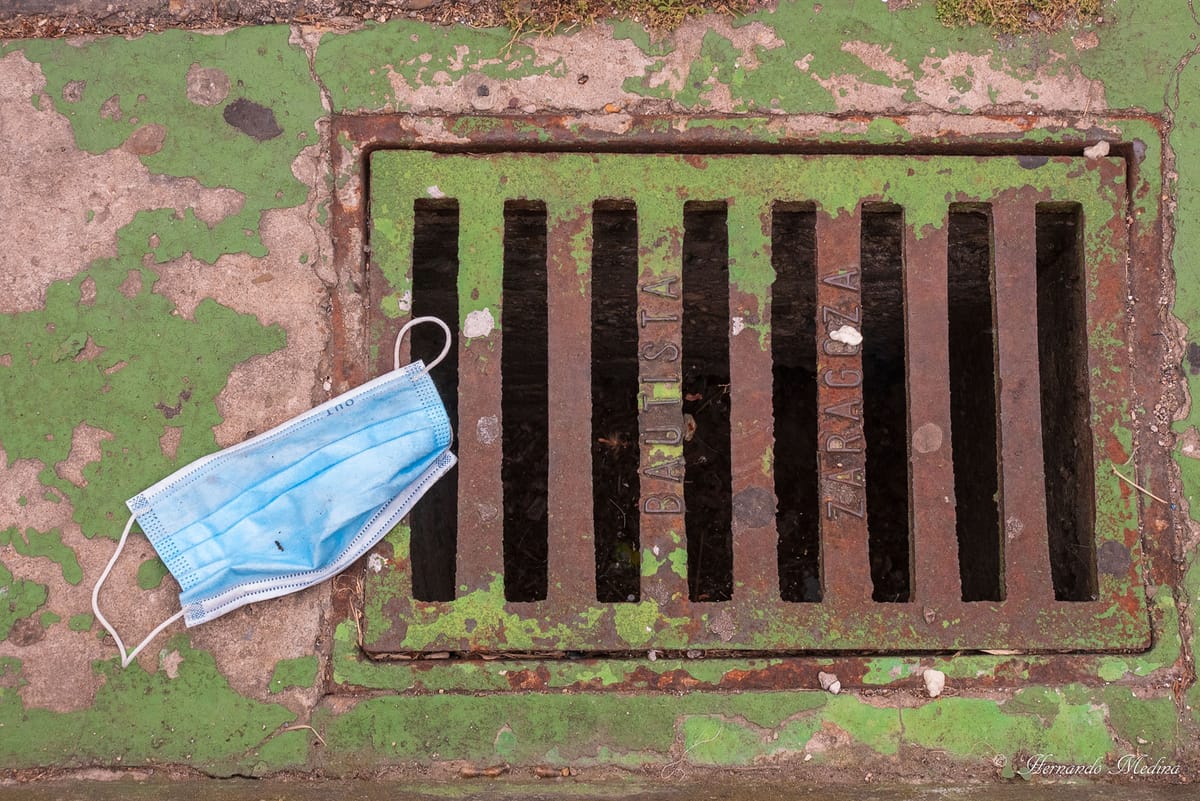
Interviews by Hayden Higgins
Andrea L. Rogers
Be nice to letter carriers. They deliver, even when lawmakers don’t.
The most important (ongoing) event of 2020 is the undermining of the United States Postal Service by those entrusted to secure its survival. USPS is one of the greater goods created by the federal government and one of the few government agencies explicitly established in the Constitution. According to the USPS website, 40 percent of USPS’s employees are minorities, while 97,000 of its more than 7.3 million employees are veterans. Postal employees, also, have access to union representation. You can send a letter across the US with an artistically rendered 55-cent stamp, have medication brought to your mailbox, or have a box of N-95 masks delivered to a Reservation. Countless small businesses rely on the post office, especially now. Also, apparently, you can vote by mail.
Holiday seasonal delays in the midst of a pandemic were foreseeable and escalated by cost-cutting policies recently put in place (illegally). This has caused dangerous and unnecessary interruptions and generated lawsuits. Be nice to letter carriers. They deliver, even when lawmakers don’t.
Least Important: The banning of TikTok. Not only did it not happen, but the threat of a ban caused even more people to download the app. Presidents, we hope they will come and they will go.
Cherokee Nation citizen Andrea L. Rogers writes fiction and nonfiction and is the author of Mary and the Trail of Tears: A Cherokee Removal Survival Story. / Twitter
Megan Marz
Critiques of old practices can flower into new practices I couldn’t have foreseen.
Most Important: The pandemic, the protests and uprisings, the many defeats of Donald Trump, the antitrust complaints against big tech companies? The more answers that come to mind, the less qualified I feel to respond to this question. One thing that has been important to me is watching the success of City Bureau, an organization in Chicago that is working to make journalism more democratic and responsive to the public. I think about it when I’m feeling cynical to remind myself that critiques of old practices can flower into new practices I couldn’t have foreseen.
Least Important: Predictions about what would or will still happen. Imagining the range of things that could happen is useful. Trying to figure out which one will happen is a distraction from doing—or trying to bring about—what you want.
Megan Marz is a writer living in Chicago. / Twitter
Maisy Card
This year, watching the endless feet-dragging while the country bled was too much.
Most Important: I’ll focus on a bright spot: Cori Bush unseating a political dynasty and going to Congress. I already knew that the majority of politicians on both sides of the aisle are millionaires who at best can’t relate to the concerns of working people and at worst can’t even pretend to care; but this year, watching the endless feet-dragging while the country bled was too much. Plus, Black progressives, like myself, ended the year holding our noses to vote for the man who drafted the crime bill, “the credit card don” who helped ensure that we’d keep drowning in student loan debt until death, just to get that even worse white man out of power. As a nurse, a frontline activist in Ferguson, a Black woman who has experienced police brutality and homelessness, and a mother who has had to raise a family while living paycheck-to-paycheck, Cori Bush is more qualified to advocate for working people than most people in Congress now.
Least Important: Liberals wasting airtime fawning over the Lincoln Project, when in the end there was no evidence that they swayed a single Republican voter. Instead, it was Black and Brown activists in states like Arizona and Georgia who made sure Trump didn’t get a second term.
Maisy Card is a librarian and author of the novel These Ghosts Are Family. / Twitter
Britina Cheng
Most Important: Spending most days with my grandpa at home and making him dinner nightly—perhaps to his dismay.
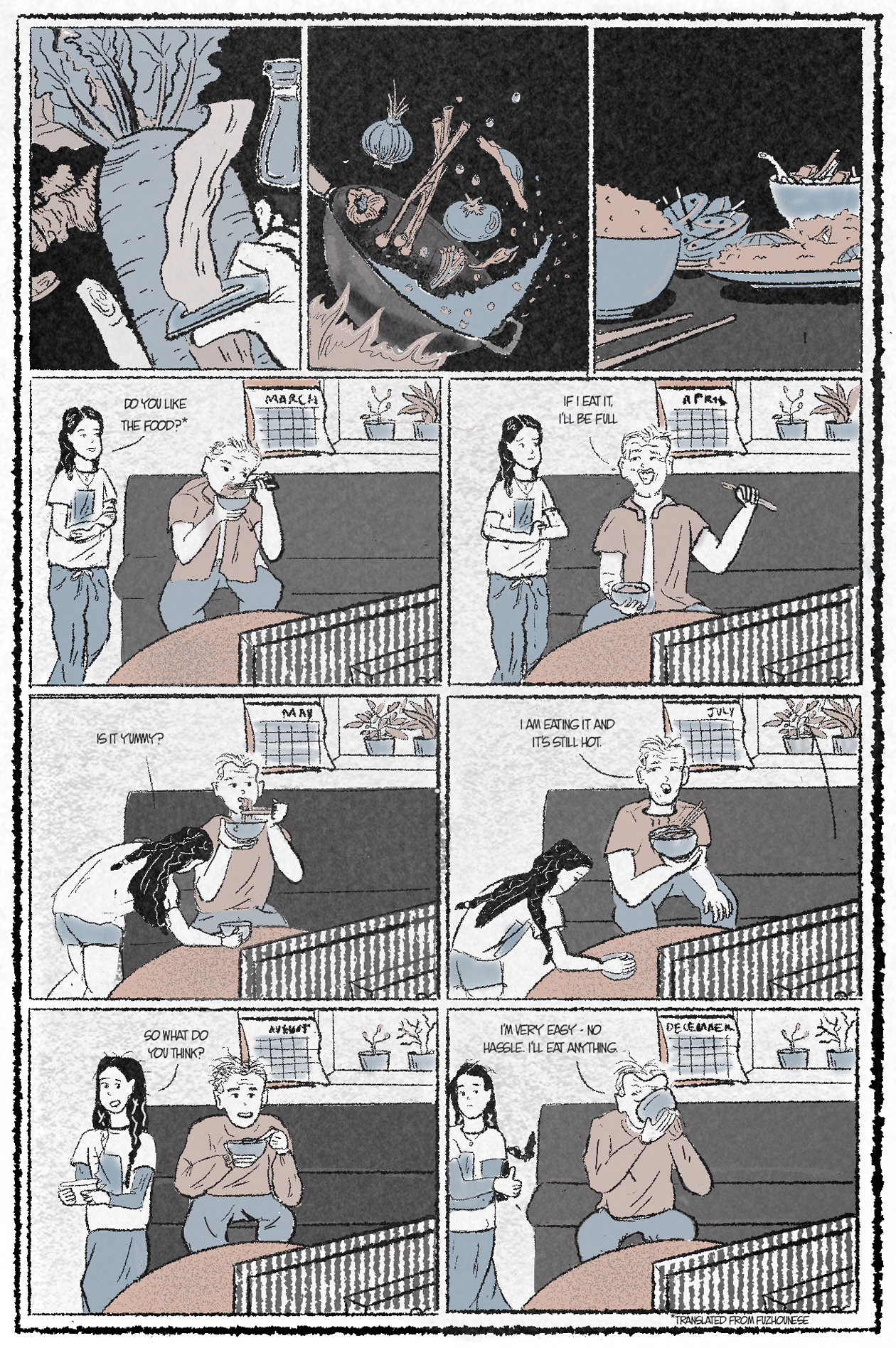
Least Important: The in-person, indoor celebrations that we missed out on; we found alternatives.
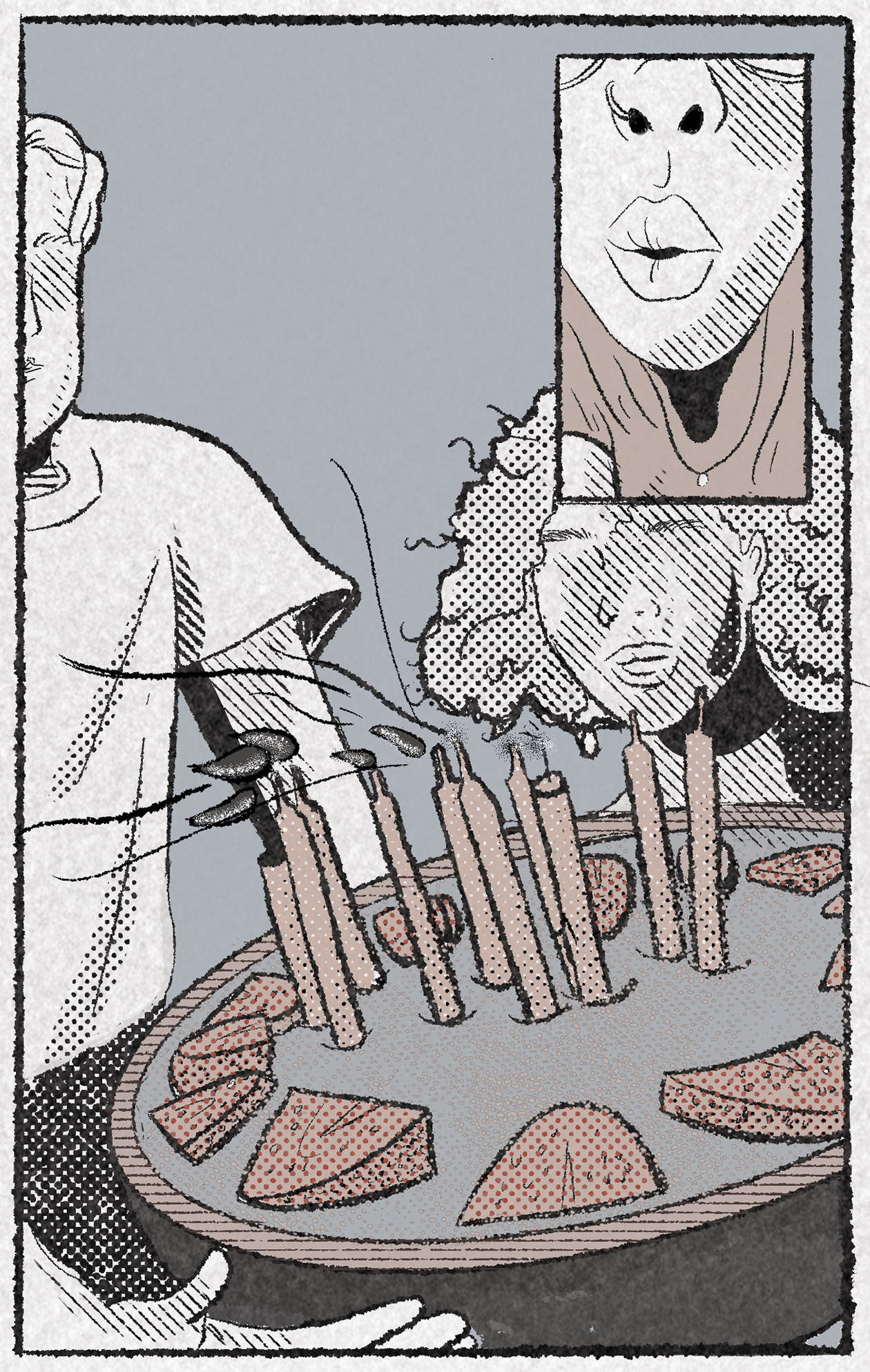
Britina Cheng is a Brooklyn writer and illustrator. You can find her artwork in her self-published graphic memoir, re:bound, and on her website. / Instagram, Twitter
Daniel Bessner
The pandemic revealed the stark inequalities that continue to define American—and global—life.
The most important event that occurred in 2020 was obviously the Covid-19 pandemic. More than any other recent event, the pandemic revealed the stark inequalities that continue to define American—and global—life. As middle-class workers stayed at home, they ordered food and Amazon packages from “essential workers” forced to put their lives, and the lives of their families, on the line, all to earn the money necessary to stay (just barely) afloat. In contrast, the least important event of 2020 was the announcement that Mr. Peanut will be replaced by a tiny peanut named Baby Nut. I believe Mr. Peanut will be dearly missed but sadly forgotten.
Daniel Bessner is an associate professor of international studies at the University of Washington. / Twitter
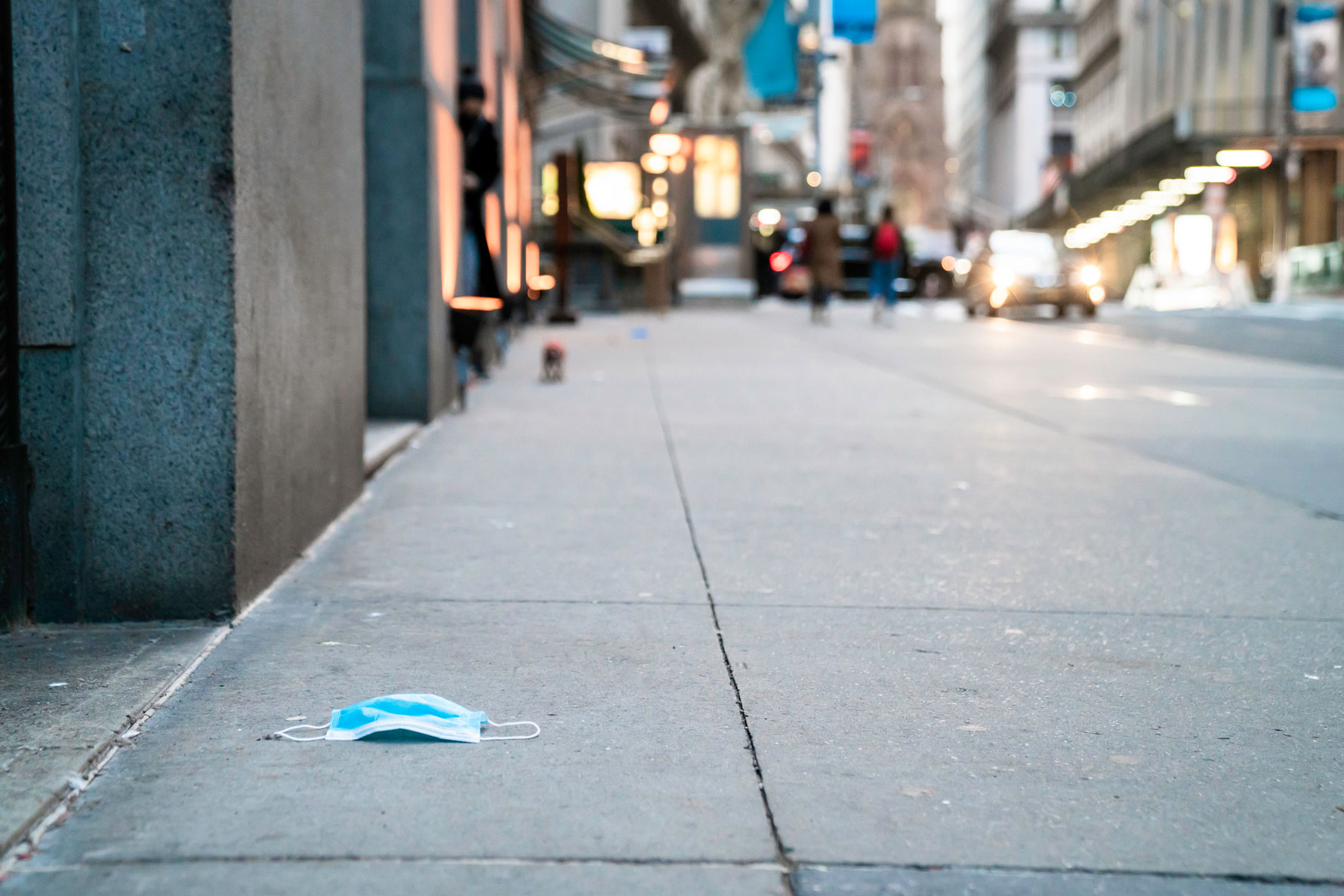
Nushin Rashidian
Oregon voters took a historic step toward ending the war on drugs.
Most Important: On Election Day, Oregon voters took a historic step toward ending the war on drugs. This war, which has cost Americans more than $1 trillion over the past half century, has failed. America is not “drug-free,” nor will it ever be, and yet the social costs of this war have been devastating.
Nearly 60 percent of Oregon voters said “yes” to Measure 110, which decriminalizes the possession of drugs for personal use. Crucially, it directs millions of dollars from law enforcement costs saved and cannabis tax revenue earned—Oregon voters legalized cannabis for adult use in 2014—toward treatment and related services.
Least Important: All newly launched celebrity cannabis products.
Nushin Rashidian is the founding editor of Cannabis Wire and teaches reporting, writing, and ethics at the Columbia Journalism School. / Twitter
Eve Peyser
I disconnected from social media to retain an iota of sanity—something important to me and literally no one else.
Most Important: The (already) sad world got sick.
Least Important: I thought writing the most important was going to be the hardest part—having contributed to this for five (or six?) years now, it usually is—but I’m a little stumped for least important. It was a year where everything was crushingly important: there was a global pandemic and what seemed to be the most consequential election of my lifetime as yet. Then we had Trump undermining democracy in increasingly scary ways and the Black Lives Matter protests bringing attention to widespread police brutality and racism. The insignificant things turned to dust in the background, like an old newspaper disintegrating in your fingertips. I know this all too well, because this year I treasured the inane and the trivial more than I ever have before, a much-needed escape to the painful reality of the present. I clung onto any scrap of celebrity drama, lost myself in videogames and action movies, spent hundreds of hours poring over crossword puzzles. And those things, paradoxically, were crazy-important to me. It was also a year where I disconnected from social media to retain an iota of sanity—something important to me and literally no one else. I have to assume that lots of petty things went down there, and I’m glad to have missed them!
Eve Peyser is a freelance writer whose work has been published in the New York Times, VICE magazine, the Guardian, New York magazine, and Esquire. / Twitter
Ilana Masad
I suspect there will be a severing of their lives’ narratives into a before and an after.
Most Important: The first global pandemic in a hundred years is a predictable answer to this prompt, but it’s the one I’ve got. The Covid-19 pandemic has shed a bright light on so many wrongs that need to be righted, it’s illuminated our frailties and the gaps in our safety nets and support systems, and beyond these systemic concerns, it has also cost hundreds of thousands of individuals their lives and altered the lives of countless others. For many people, globally, I suspect there will be a severing of their lives’ narratives into a before and an after.
Least Important: The least important thing that happened was Quibi. I mean, I’m sure that it was important to many people in terms of their jobs and their salaries and there were people who surely were overjoyed when it launched and suffered when it ended, but like, on the whole? Globally? Truly, a blip that will be lost to history. Sorry, Quibi.
Ilana Masad is a fiction writer and books and culture critic whose debut novel, All My Mother’s Lovers, came out with Dutton this year. / Twitter
Maximillian Alvarez
We were made painfully aware of how much (and how little) we are worth in this country.
2020 was a rare, terrible gift of a year: a year in which, without request or input, we were made painfully aware of how much (and how little) we are worth in this country. Throughout the Covid-19 pandemic, when what we needed most was so maddeningly clear from the start, what we received, instead, was ruling-class intransigence from our unfeeling government; an unquestioned need to feed the cold, voracious hunger of an “economy” demanding human sacrifice; the naked viciousness of so many reckless neighbors and strangers, for whom the notion of social solidarity is so foreign that being asked to practice it has been genuinely enraging, even painful, for them. How much are our lives worth to these people/things? If we didn’t know the answer before, now we do. At the same time, while normal life and loved ones have been ripped from us, we have also learned, remembered, and come to miss what is most needful to us, as human beings—beings who, we now know, simply start withering away without one another. I hope that 2020 will be the year we all realized, truly, how much we all need each other. And I hope that in the future we try harder to make this—not the dogged war of all against all and all for themselves—the guiding principle of our politics.
Maximillian Alvarez is editor in chief of The Real News Network and the host of Working People, “a podcast about the lives, jobs, dreams, and struggles of the working class today” (in partnership with In These Times). / Twitter
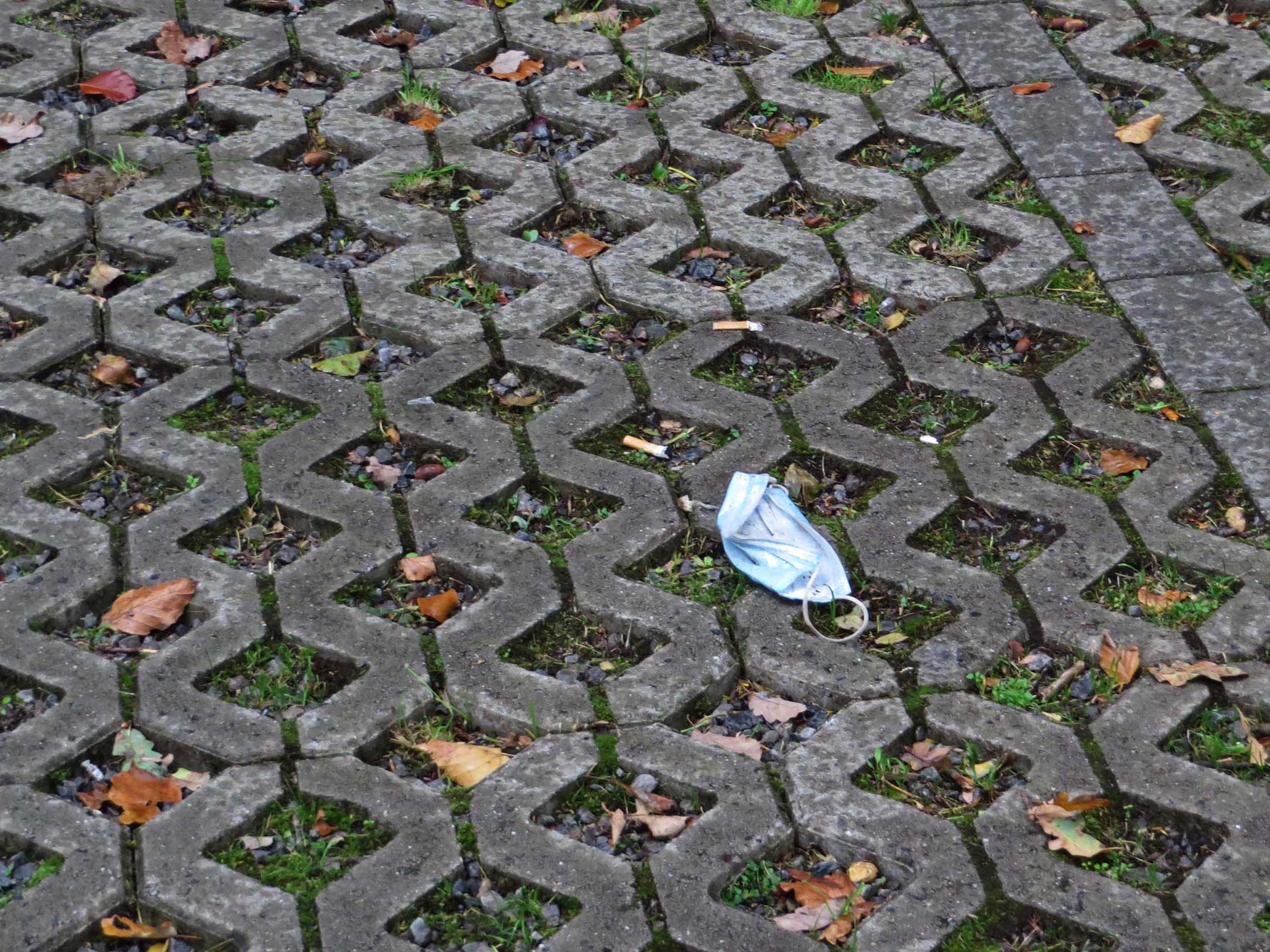
Jenny G. Zhang
There’s no flip switch back to “normalcy.”
There are those who would believe that 2020 is a lost year. It happened, but without all the signifiers that typically mark the passage of time—celebrations, vacations, career milestones et al.—did it really? At best, some might consider it a holding period before their real lives can start again at the stroke of midnight. For a year that is so significant in its history making, it will be oddly remembered by many as one of the least important spans of time on a personal level.
But the most important thing about this year is that it will not end. There’s no flip switch back to “normalcy”; the past, the present, and the future don’t work that way. The repercussions of all the deaths—more than 1.7 million worldwide from Covid-19—cannot be erased. Nor can the people who lost their jobs, the businesses that failed, the students who were left behind by schools’ switch to remote learning. Those who still feel the effect of the virus on their lungs, their tastebuds, their brains. Those who were arrested while protesting anti-Black violence and police brutality; those who lost an eye from it; those who were killed. Those who this year finally woke up to the reality that The Way Things Work here is cruel and unconscionable by design. The most important thing to happen in 2020 is all of it. We cannot forget a single part.
Jenny G. Zhang is a culture writer, critic, and podcast host (sorry). She currently works for Eater. / Twitter
Ted Scheinman
If Woodward had released the audio when it was fresh, maybe those 650 million masks would have gone out.
Most Important: Bob Woodward’s decision to sit on an April interview with President Donald Trump for five full months, until the September release of Woodward’s book Rage. I’m not sure any episode from 2020 captures the failings of America’s ruling class more vividly. In the interview, conducted April 13, Trump contradicted public statements in which he’d made light of the virus, telling Woodward that the virus was “a killer” and a “plague”: “Bob, it’s so easily transmissible, you wouldn’t even believe it,” Trump said.
During the five months that elapsed between the interview and Woodward’s release of it, more than 160,000 Americans died of Covid-19.
Woodward’s interview came during a fluid period of the early pandemic, when the culture war over masks, for instance, wasn’t yet fully entrenched. In fact, right around when Trump was talking to Woodward about a “plague,” Trump’s own Health and Human Services Dept. was preparing to use the Postal Service to distribute 650 million masks across the country, a plan the administration ultimately quashed. If Woodward had released the audio when it was fresh, maybe those 650 million masks would have gone out, maybe many more Americans would have worn them, maybe more Americans would have understood the virus was a real threat, and maybe we could have avoided tens of thousands of deaths from the virus. Instead, Woodward awaited his payday. That’s pure Covid profiteering—and it’s hard for me to see how Woodward’s decision to guard the tape is so very different from the behavior of senators who have done insider trading based on classified Covid briefings. No matter how deeply Trump may have concerned his fellow members of the ruling class, they were always more concerned with looking out for themselves.
Least Important: Tiger King.
Ted Scheinman is a senior editor at Smithsonian magazine and the author of Camp Austen: My Life as an Accidental Jane Austen Superfan. / Twitter
Sarah Jones
If you’re not familiar with QAnon, first tell me your secret.
Most Important: America, the land of the free and the home of the brave, can now add a new feather to its tricorn. This November, voters elected two QAnon supporters to Congress. Marjorie Taylor Greene of Georgia and Lauren Boebert of Colorado have both expressed varying degrees of support for the bizarre conspiracy theory. If you’re not familiar with QAnon, first tell me your secret, but also, let Taylor Greene herself explain: “There’s a once-in-a-lifetime opportunity to take this global cabal of Satan-worshiping pedophiles out, and I think we have the president to do it,” she said in 2017. That president, of course, is Trump; the Satan-worshipping pedophiles make up the deep state.
Is this insane? Sure. Is it important? Yes, absolutely, as are the elections of Taylor Greene and Boebert. In fact, I believe their respective journeys to Congress are, combined, the most important thing that happened this year. The Trump presidency will soon become an unfortunate memory. But the president’s conspiratorial, far-right rhetoric has tapped into something that won’t disappear so quickly, and Taylor Greene and Boebert are proof. Around 40 percent of Republicans who have heard of QAnon think the conspiracy theory is a good thing for the country, Pew Research reported in September. I don’t know what to do with that, exactly, and I am fairly certain that President Joe Biden doesn’t either. Good luck next year, everyone!
Least Important: Operation Warp Speed. Remember that? Maybe not, since it accomplished nothing. The White House claimed this project would speed up the manufacture and dissemination of a vaccine for Covid-19. This was about as helpful as their efforts to bring peace to the Middle East. Didn’t happen! But Trump tried to claim credit for the Pfizer, Moderna and AstraZeneca vaccines anyway. The lackluster performance of Operation Warp Speed was probably not as consequential as Trump’s anti-mask, anti-lockdown rhetoric, so rather than being evil, it deserves to be remembered for simply being pointless.
Sarah Jones writes for New York magazine. / Twitter
Seyward Darby
America can no longer say it’s a place where attempted coups don’t happen.
Most Important: The attempted coup.
I once had a side gig editing reports for Freedom House assessing the state of political rights and civil liberties in Central Asian countries. Topping the list of Things That Hurt Freedom was interference in elections. Think suppressing votes, tossing out ballots, seeking to overturn results when they don’t go your way—think, in other words, about everything the GOP has done since Trump lost the presidency. America can no longer say it’s a place where attempted coups don’t happen. Oh how the high and mighty have fallen! In all seriousness, though, This. Is. Fucking. Terrifying. Just because one coup fails doesn’t mean the next one will. Nor does it mean that people who support the overthrow of democracy are done fighting, though they might shift tactics. We mock or minimize failed lawsuits and Stop the Steal rallies at our own peril.
Least Important: Quibi.
This tweet about the streaming service’s utter failure to launch is [chef’s kiss]:

Seyward Darby is the editor in chief of The Atavist Magazine and the author of the book Sisters in Hate: American Women on the Front Lines of White Nationalism (Little, Brown, 2020). / Twitter
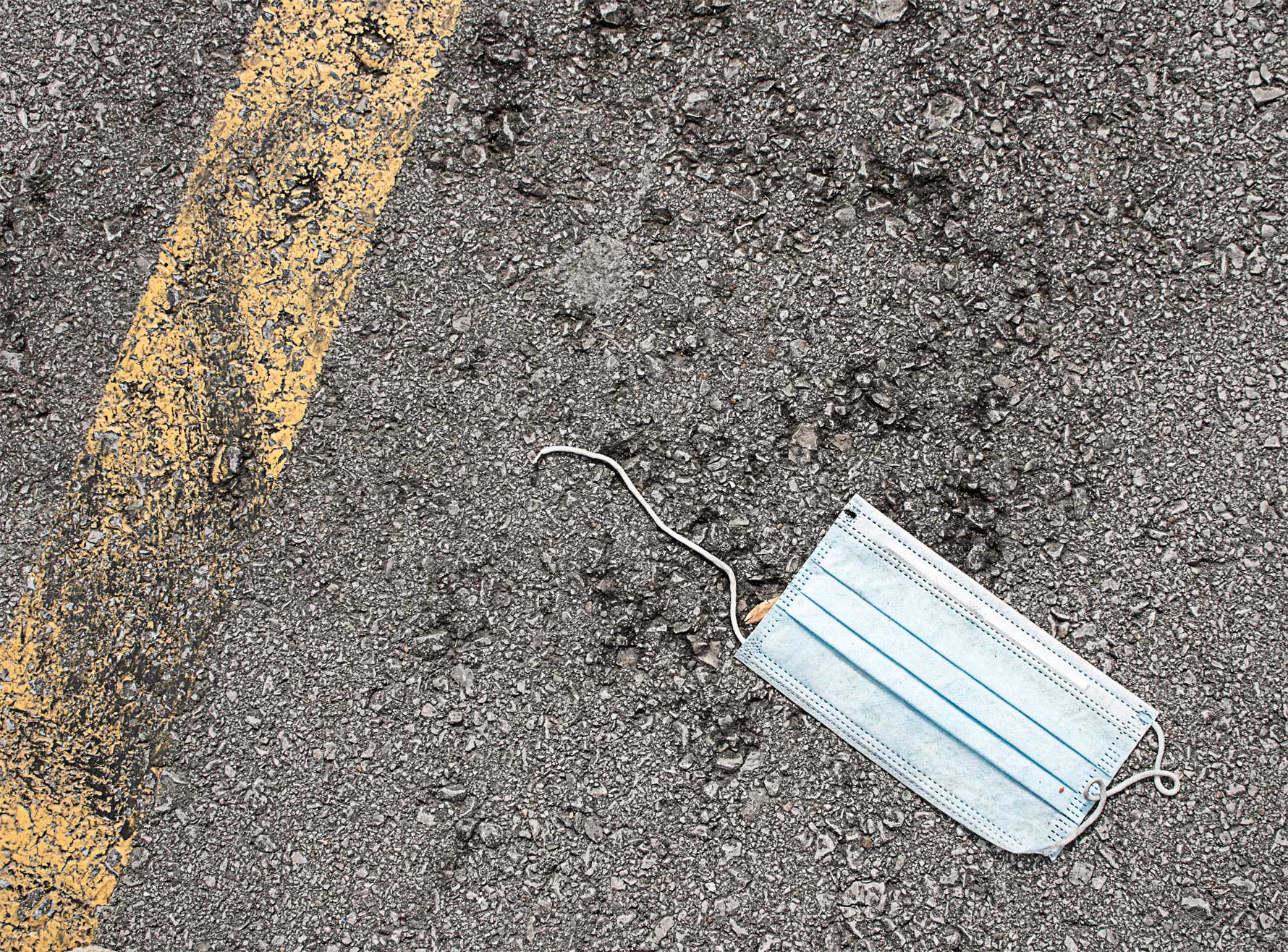
Lucia Graves
That means learning to process and talk about catastrophe in productive ways.
Least Important: All of the terrible things that happened in 2020. (I have your attention now, right?)
Most Important: Recognizing that what happened in 2020—the converging catastrophes of a global pandemic, confronting racism and the reactionary backlash, an economy broken for all but the rich, and the increasingly devastating effects of climate change—is not intrinsic to this year nor will it all magically disappear at its close. These are complex, deep-seated problems that we’ll be grappling with for years and decades to come. Whether we succeed in rising to meet the challenges posed will depend in no small part on how we think, feel, and talk about them, which will in turn determine what we do and what others and especially Democratic leaders are called upon to do as well. That means learning to process and talk about catastrophe in productive ways. Rather than just screaming “crisis!” into the void (a popular approach on Twitter) or wrapping ourselves in a cocoon of denial or removal (see Instagram), we must channel the anger born of the grief that stems naturally from paying attention to what’s unfolding, so as to inspire the hope and ultimately the courage to find the necessary solutions—and ultimately, to act.
Lucia Graves is a freelance writer based in Washington, DC, whose work has appeared in the Washington Post, the Guardian, the New Republic, Columbia Journalism Review, Pacific Standard magazine, Vulture, and elsewhere. / Twitter
Bijan Stephen
The year was not an aberration.
What a fucking year. The most important things that happened: the global Covid-19 pandemic; the Black Lives Matter uprisings of the spring, summer, and fall; Donald Trump’s loss; the rapidly changing climate. These, of course, are all the same story.
2020 exposed the unique brutality of life in America. It has also shown that the system is working as it was designed to; the cruelty is not a side effect, and the year was not an aberration. Anyone who still fails to see that has chosen not to care about other people.
I’ve internalized the lesson: There is nobody coming to save us, and the wolf is at the door. All that’s left to do is care for the people near you the very best you can.
Bijan Stephen is a reporter at the Verge, a music critic at the Nation, and a columnist at the Believer. / Twitter
Aude White
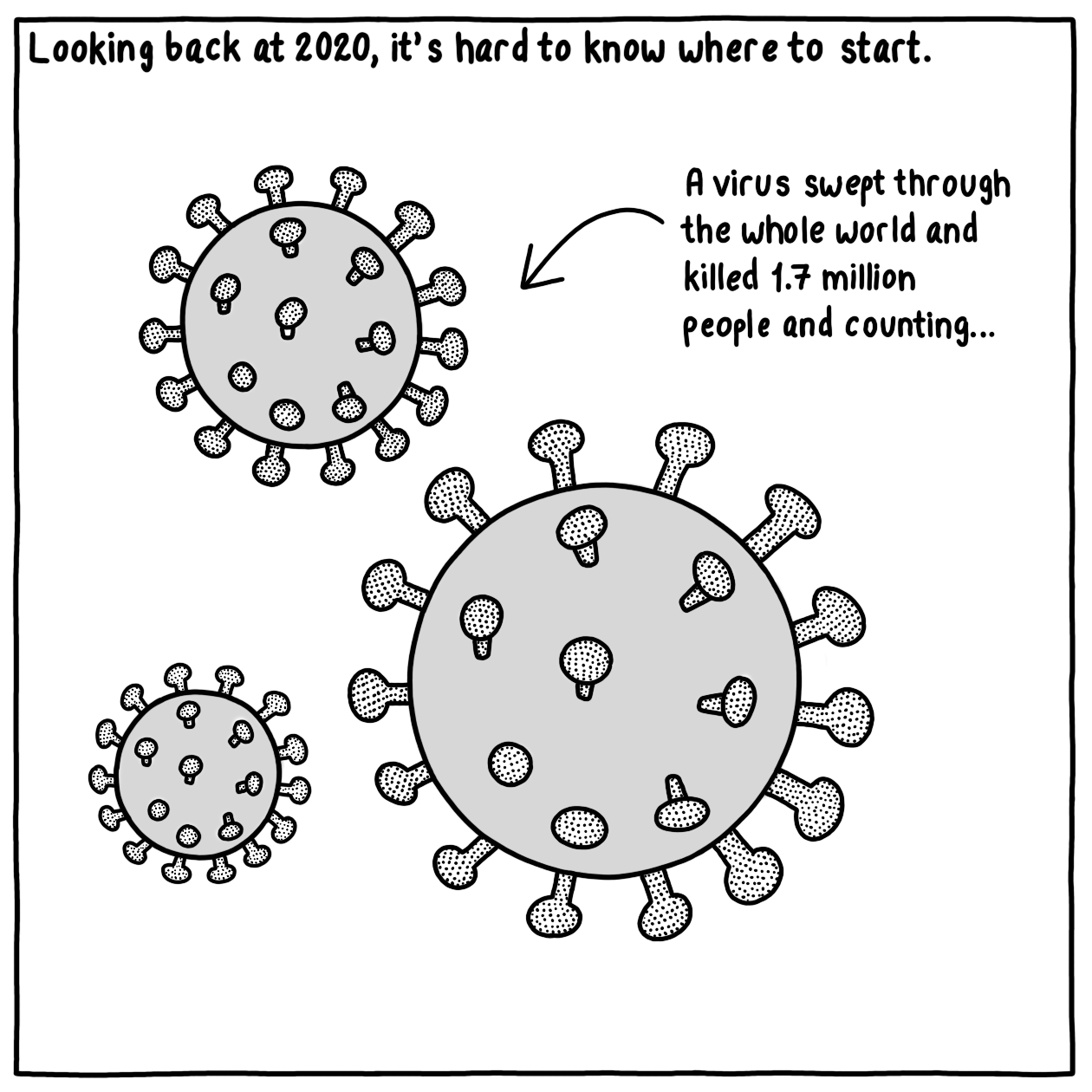
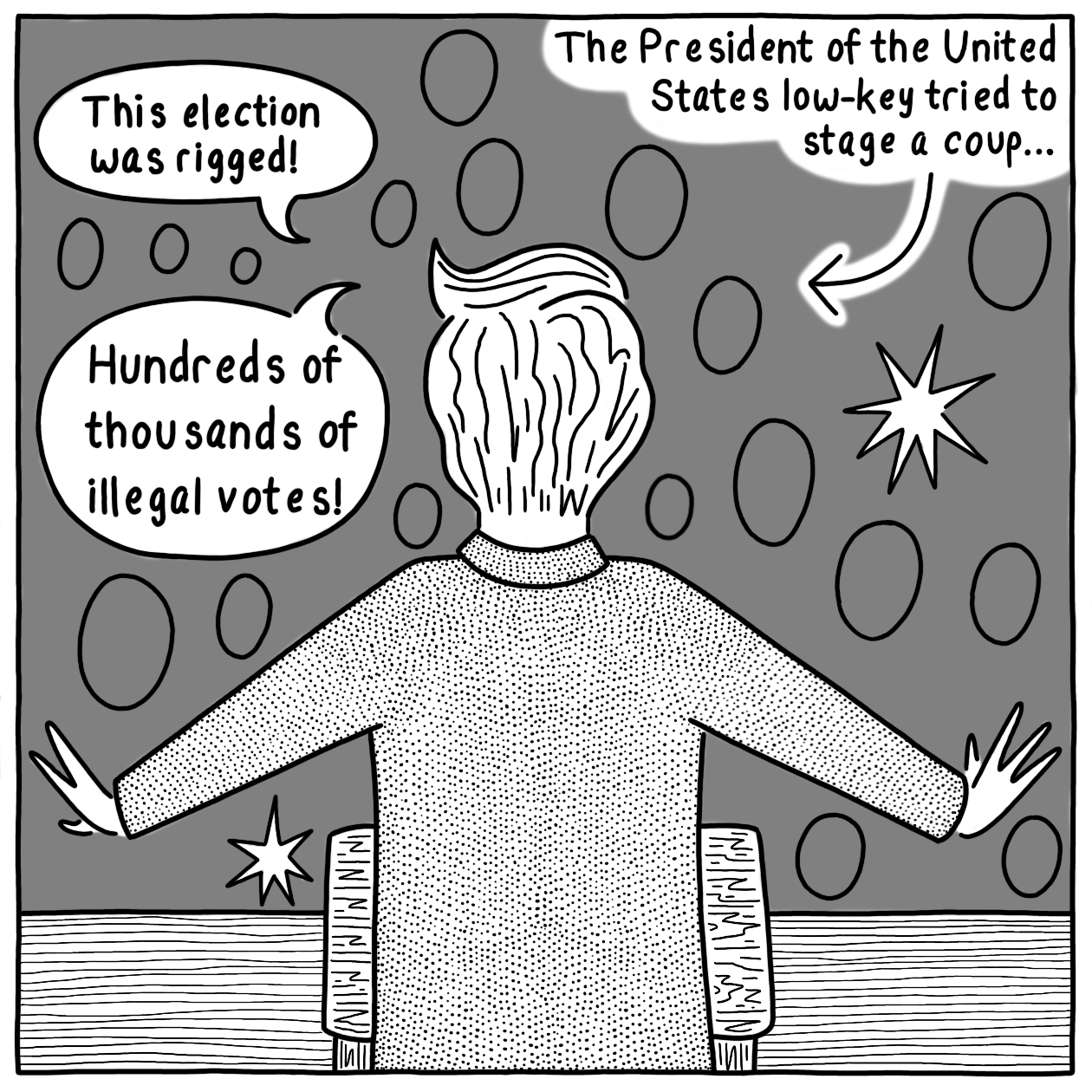
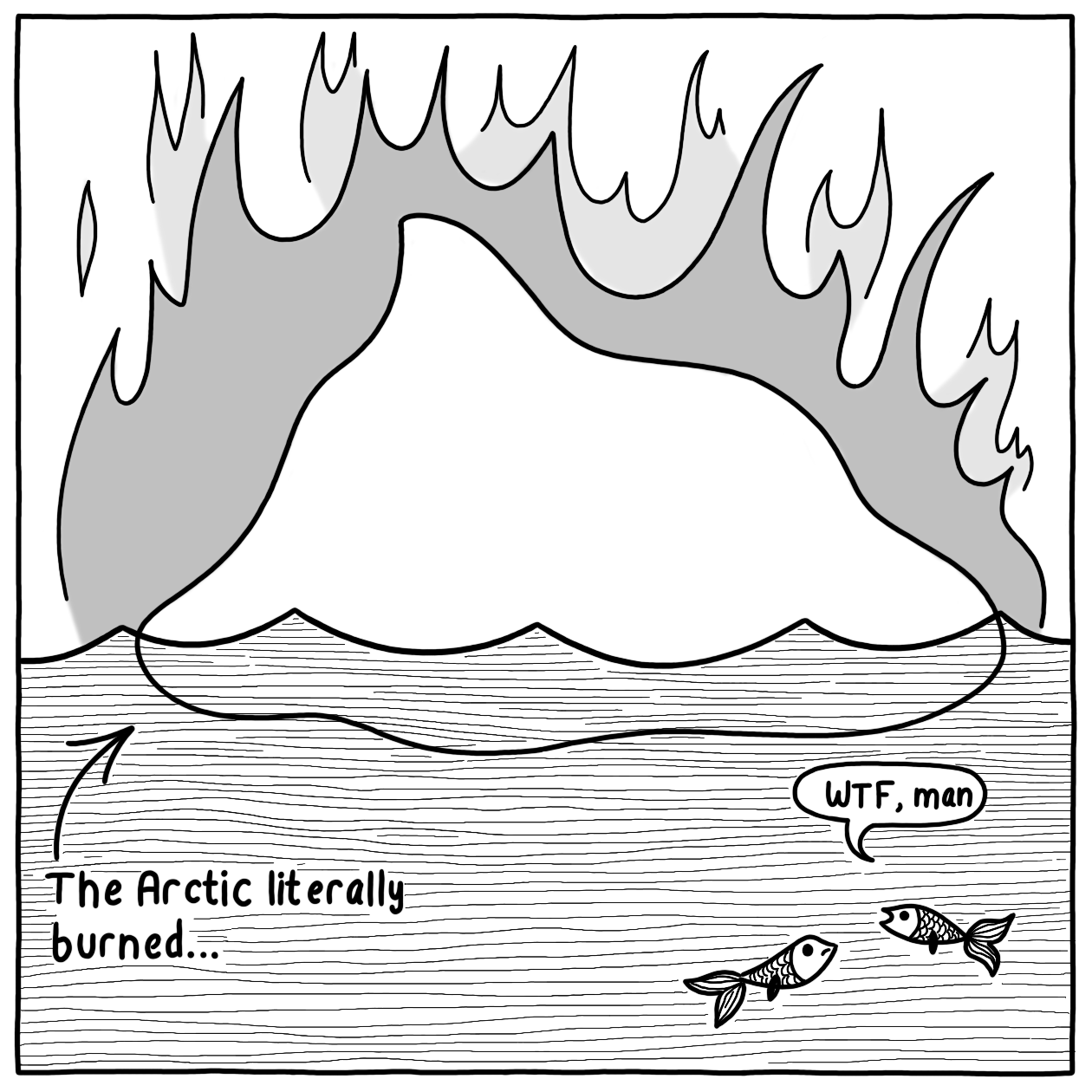
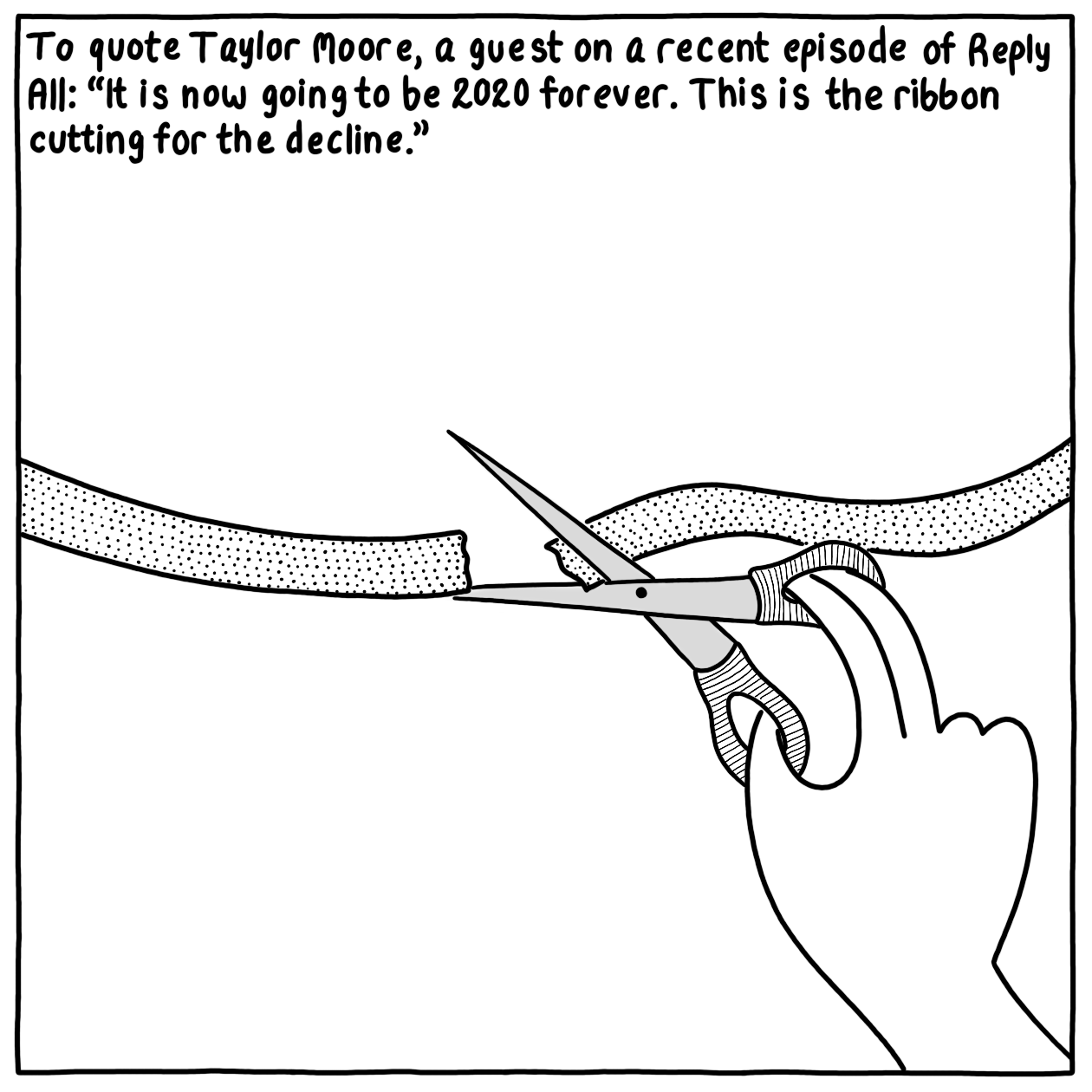


Aude White is a graphic artist whose work has appeared in the New York Times, New York magazine, the Believer, and more. / Twitter
Shannon Stirone
Watching us at once make decisions to fundamentally alter our lives has really been something and made us closer.
Most Important: We all went inside. This year asked us to collectively retreat in order to save each other. Even the fires in California demanded the same when we couldn’t breathe. Watching us at once make decisions to fundamentally alter our lives has really been something and made us closer. It’s also divided us in a way, those who stay inside and wear masks and those who don’t. Covid and our nearly yearlong quarantine have forced us to face our humanity as well as just how delicately we are all here.
Least Important: This year was so utterly bizarre in every possible way it’s hard to imagine anything being the least important, but I think possibly the farce that was Four Seasons Total Landscaping might be it. Possibly the most absurdly funny, but least important.
Shannon Stirone is a writer whose work can be found in the New York Times, the Washington Post, and others. / Twitter
Amy Brady
Her presence in the new administration is a hopeful sign that Biden is serious about combating climate change.
Most Important: President-elect Biden chose Deb Haaland, an Indigenous woman, to lead the Dept. of the Interior. Her nomination is historic, not only because she’s the first Native American woman to hold a cabinet secretary position, but because she’ll be leading an agency that has a long and horrific record of dislocating Native peoples. She is also an outspoken supporter of the Green New Deal. Her presence in the new administration is a hopeful sign that Biden is serious about combating climate change.
Least Important: The distinction between business and leisure attire. In my little world, at least, it didn’t exist. I switched to full-time sweatpants in March, and I’m not sure I’m ever going back.
Amy Brady is the Deputy Publisher of Guernica magazine and co-editor of House on Fire, forthcoming from Catapult. / Twitter
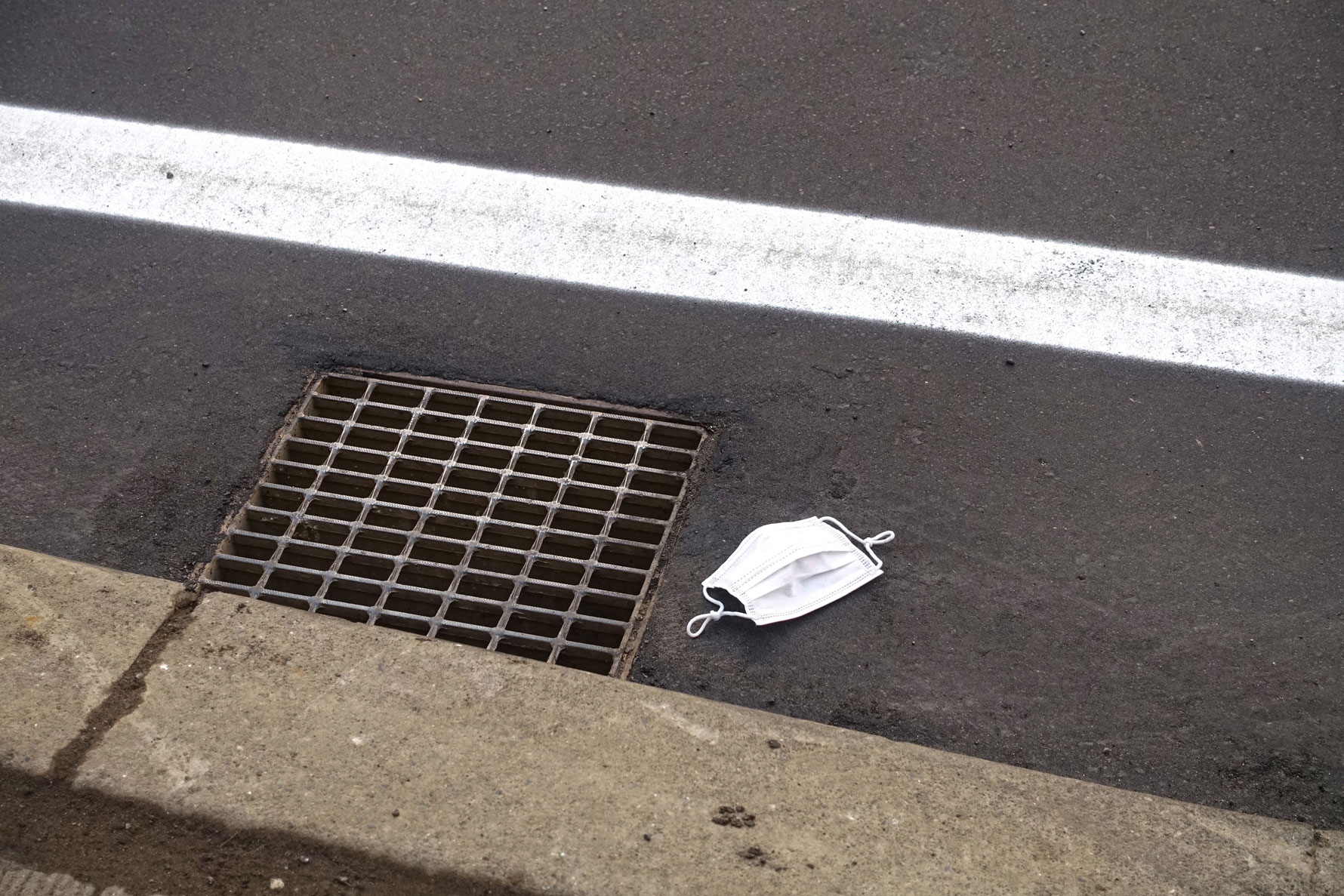
Samantha Allen
More than 40 percent of registered voters said climate change was “very important” in their choice.
Most Important: Climate change really truly mattered this time around. Pew Research Center data shows that more than 40 percent of registered voters said climate change was “very important” in their choice—and exit polls suggest the issue may have played a decisive role in the election outcome. You might think that having a habitable planet would be more important to the people who, you know, live on the surface of said planet, but sadly it’s taken until now for serious concern over climate change to even crack the 60 percent mark in America. Let’s hope that this emerging consensus isn’t happening too late.
Least Important: The Covid-19 pandemic. I don’t mean this in a flippant way. The preventable loss of so many human lives in so short a span of time is unfathomable. The tendrils of that trauma have reached their way into every heart, my own included. But to be not just monumental but important in a historic sense, an event must have some sort of lasting impact on the state of affairs, and ultimately the Covid-19 pandemic won’t meaningfully interrupt—and indeed will probably only exacerbate—capitalism’s doom spiral. Sadly, all this death won’t redefine American life; rather, it’s become part of it.
Samantha Allen is the author of Real Queer America: LGBT Stories From Red States. / Twitter
Margaret Howie
The super-rich turned out to be worthless.
During an existential threat to humanity, the super-rich turned out to be worthless, in the same way they’ve routinely been useless during the last few existential threats. They’re happy for the oceans to boil so long as they’re saved from the indignity of paying a little tax, and it didn’t matter anymore in 2020 than it did a year ago. That’s why the least important event of this year was Charles Koch admitting that his role in creating partisan social divide through conservative political groups was, in his own words, a “screwup.” Hey, we all make mistakes!
Maybe the most important event of this year happened in a lab, or a string of code, or a realization on a street corner. Perhaps all the bears developed telepathic powers and started planning how they’d take over and eat us all. Our world is too big and complex for me to see it, but this year’s most important moment for my serotonin levels was when the statues of racists, imperialists, and sundry mass murderers started feeling the effects of gravity. And sledgehammers. This was the best remix of the century.
Margaret Howie has a newsletter called Three Weeks and is aggressively pro end-of-year lists.
John J. Lennon
Trump’s like this toxic yard boss.
The most important event that happened in 2020 was Trump getting voted out, of course. A part of me, the convict who became a journalist in prison part, respects Trump for doing what so many thought he couldn’t do. But Trump was a terrible leader because he couldn’t temper his ego. He had no restraint. In prison, I try to avoid these troublemakers—mean-spirited, impulsive guys who gossip, manufacture beefs, catch delusions, create prison politics that swirl through the yard and cellblocks, and then sit back and thrive off the drama. Trump’s like this toxic yard boss. I mean, there’s a lot of sick people in prison so you kind of expect this behavior. But you don’t expect it from the person in the White House. It makes you a cynic about things like justice and pretty much life in general. But I don’t want to feel like that. I don’t think any of us do.
The least important event that occurred in 2020, though it could have become quite dangerous, was Trump being a sore loser and claiming the election was rigged. We expected that. But we didn’t accept it.
John J. Lennon is a contributing editor for Esquire magazine and contributing writer for The Marshall Project. / Twitter
Jason Adam Katzenstein
Most Important: The sustained global protest movement for Black liberation.
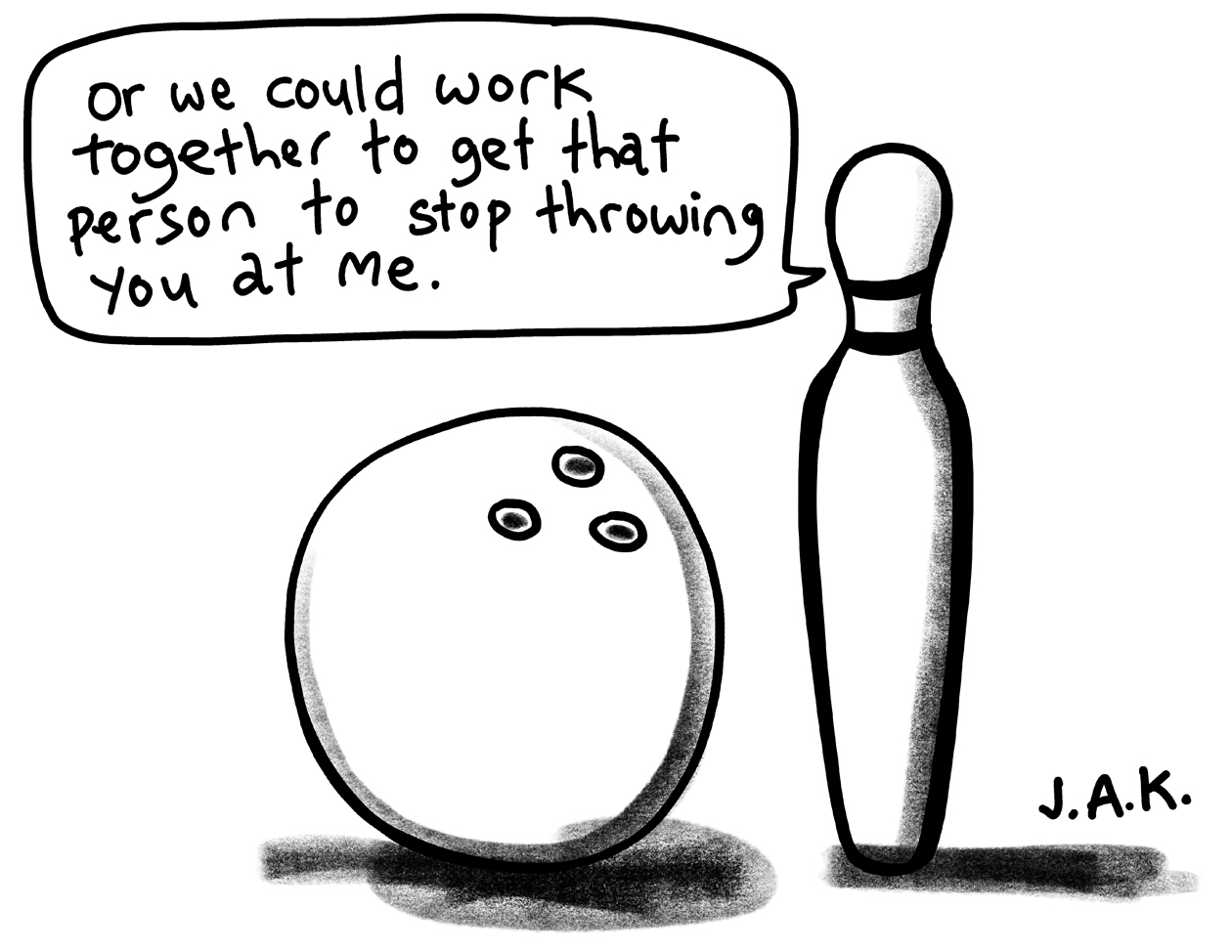
Least Important: It’s a tie between “Cancel Culture” and “Statue Discourse.”
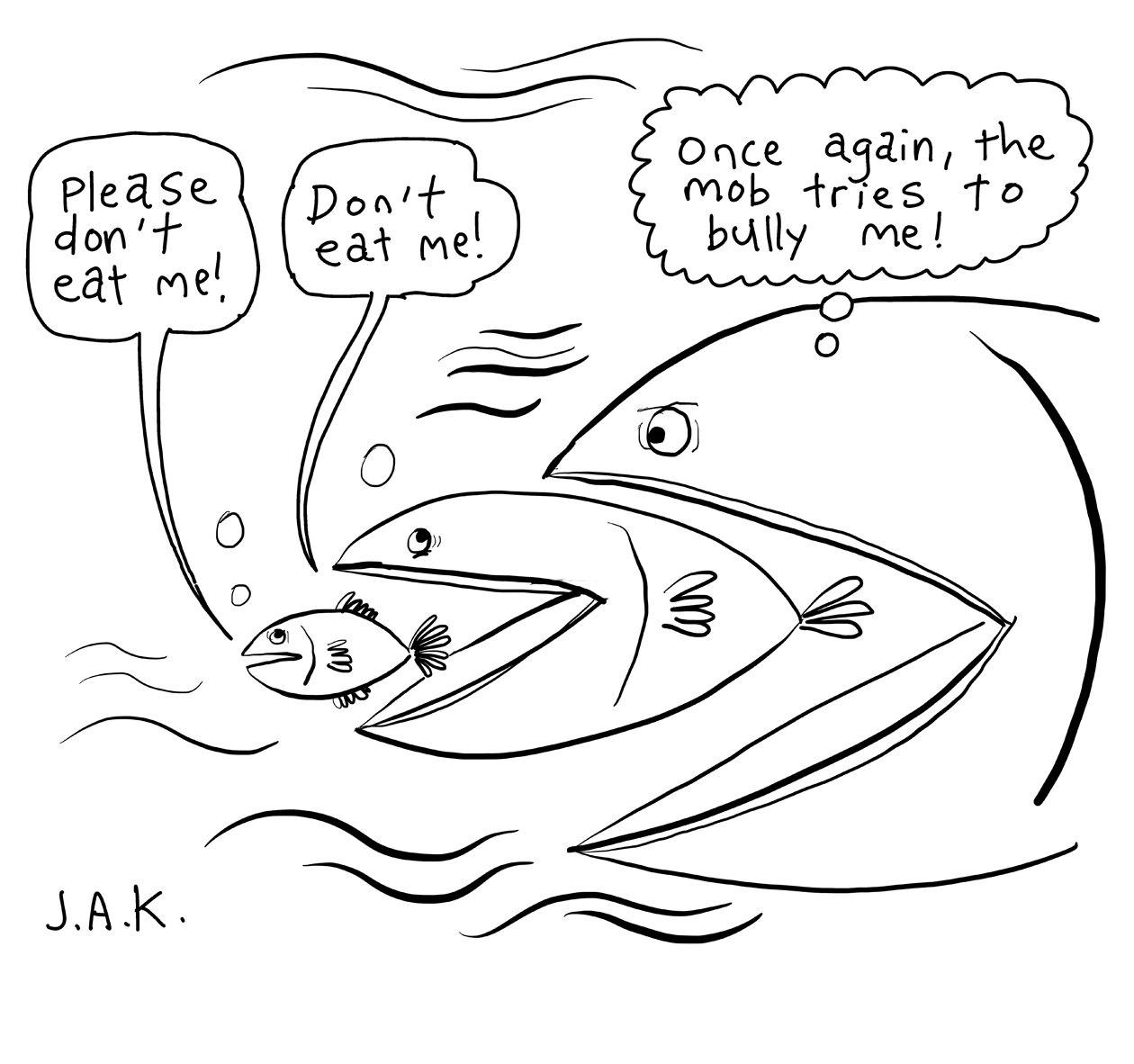
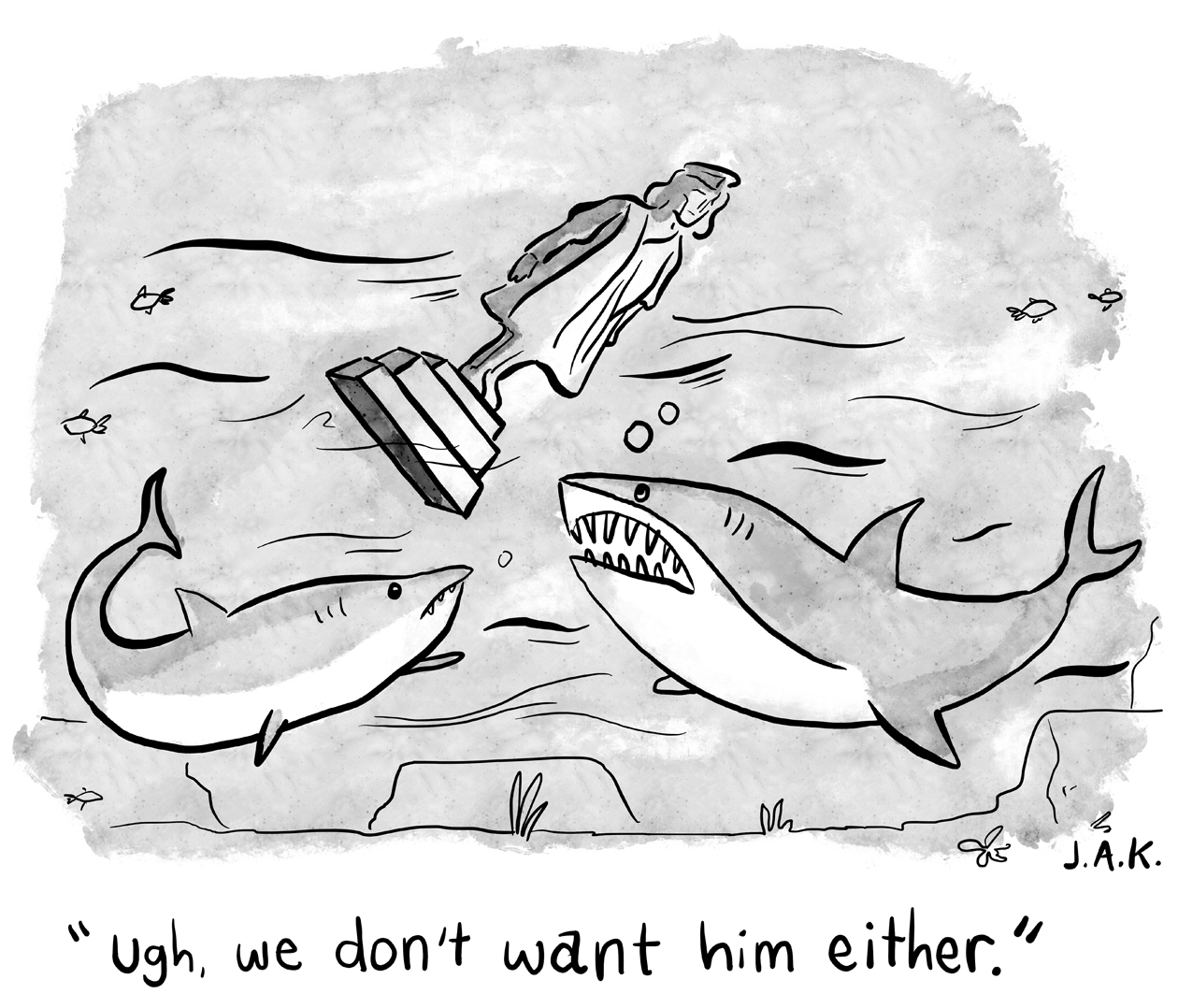
Jason Adam Katzenstein is a cartoonist for the New Yorker, editor for The Brick House, and the author and illustrator of the graphic novel Everything Is an Emergency. / Twitter
N.M. Kerr
Sports were back, but they would not be made into a simple distraction.
Most Important: On March 11, 2020, America (and much of the English-speaking world) watched with bated breath as professional sports, beginning with the NBA, shut down. It was the first sign of the enormity of the reach of the pandemic to come.
On June 27, barely three months later, professional sports resumed with the first game of the National Women’s Soccer League’s Challenge Cup. Not only was this a historic day for women’s sports (becoming the first professional sport back), and for women’s soccer (it was the first time a game had been carried on a mainstream tv station, and it garnered the largest audience recorded at that time), it was a historic day because of how the players intentionally turned the focus away from the return of sports. As one, the North Carolina Courage and the Portland Thorns donned Black Lives Matter T-shirts; wrapped Black Lives Matter armbands around their biceps; and knelt in one long line of protest during the playing of the national anthem. A statement had been made: Sports were back, but they would not be made into a simple distraction.
Least Important: The Dodgers won the World Series. The Lakers won the NBA Championship. Next.
N.M. Kerr is a writer, podcaster, and general nerd in the Bay Area. She is the founder of Foul Puck: Sportsball for the Rest of Us, a podcast about sports for nontraditional sports fans. / Twitter
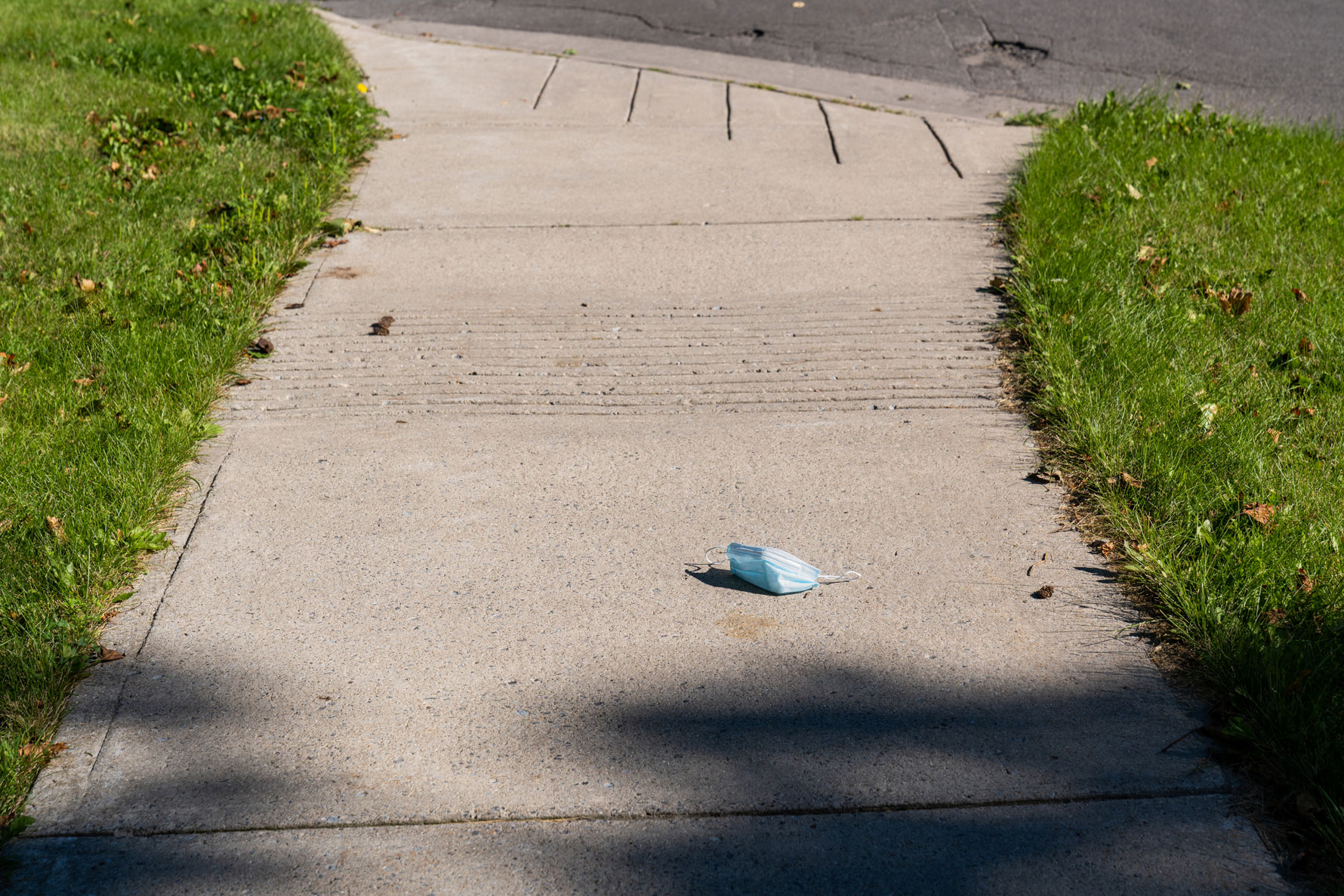
Ryan Broderick
These things won’t disappear when crowds return. They will get better.
Most Important: Nothing will ever really need to be anywhere again.
Covid-19 has dragged the world into its fully online, placeless future. And it’s not just our workplaces. Cities are changing—apparently all the rich people live in Montana now. Video games like Fortnite and Roblox held massive virtual concerts. Most people have had to sit through at least one Zoom game of Jackbox that went on too long. Normal people bought Pelotons!
These things won’t disappear when crowds return. They will get better. Our future is one giant transmedia popup that happens simultaneously in hype houses around the world, with millions of followers watching from home. And the only thing that will matter is an internet connection.
Least Important: President Donald Trump will leave office and nothing will change.
The rot is too vast. President Trump has appointed almost a quarter of the federal judges in the country. We, as a country, hate each other. The American identity is now defined either by, or, in opposition to, Trumpism. Far-right gangs roam the streets with assault weapons. Online, Facebook, Twitter, and YouTube turn our loved ones’ brains into fascist soup. We have QAnon followers in Congress.
But I suspect the defining characteristic of the post-Trump era will be just how many new Trumps there are. And these new would-be authoritarians will be smarter and more efficient than the one we’ve just had.
Ryan Broderick is a freelance writer and podcaster who writes the Garbage Day newsletter about internet culture and technology. / Twitter
Maria Bustillos
She was 80 years old, a survivor of colon cancer, a legend, and high on her own supply.
Most Important: Ruth Bader Ginsburg’s death didn’t only guarantee that the Supreme Court would fall into the hands of underqualified right-wing ideologues, debasing and politicizing the judiciary for decades to come. It revealed in razor-sharp lines how US democracy has been crippled by the “meritocracy” that privileges individuals over institutions. Obama asked Ginsburg to retire in July of 2013, with the Senate still in Democratic hands. She was 80 years old, a survivor of colon cancer, a legend, and high on her own supply. It’s a tragic irony that this iconic jurist judged her most important case—her own—so very wrongly, with terrible implications for the future of the world.
Least Important: The emergence of much-hyped pro-Trump media outlets such as OAN, NewsMax, Parler, and MeWe. MAGAs worship power, and Trump has lost it; his hold over his followers diminishes by the day. When the true record of the villainy of this administration emerges, as it must, we’ll be facing a new reckoning not just for Trump’s political future and that of the MAGA right, but for the whole of the Republican Party that saw fit to put him in power.
Maria Bustillos is founding editor of Popula and The Brick House. / Twitter
Rahel Aima
The law abolished cash bail for most misdemeanors and nonviolent felonies.
Most Important: New York State’s bail reform, which was passed in 2019 but went into effect in January. It looked to reduce the staggering numbers of people incarcerated pre-trial because they couldn’t afford to pay bail, or didn’t have anybody to pay it for them. This includes administrative or dollar bail, where people can be held for weeks or months over as little as one dollar! It’s a phenomenon that disproportionately affects people of color; even if someone is quickly released, it can be enough to jeopardize their jobs, access to housing, or custody of their kids. The law abolished cash bail for most misdemeanors and nonviolent felonies, an estimated 90 percent of all arrests.
Never ones to be accused of having a spine, state Democrats soon gave into pressure from law enforcement and other groups, and rolled back some of the reforms by April. It’s a setback that nevertheless doesn’t diminish the brief flowering of possibility and the way that the reforms energized the ongoing fight for abolition.
Least Important: The US election.
Rahel Aima is a writer from Dubai. She can be found at nightlife. / Twitter
Patrick Redford
What started as a discrete action grew to encompass all American sports for a week.
Most Important: Earlier this summer, NBA players briefly, gloriously went on strike. The strike was not a deliberate product of organization by the NBPA, though it inspired a wave of stoppages across the sports world. The shooting of Jacob Blake by Kenosha, Wis., police had just happened, and Milwaukee Bucks guard George Hill decided he was simply not in a place where he could take the floor. His teammate Giannis Antetokounmpo, the two-time reigning MVP, joined him, then the rest of his team did, and what started as a discrete action grew to encompass all American sports for a week.
Least Important: The few weeks in late March and early April when, for some reason, we were told that Covid was “the great equalizer.” Nine months of rich people gobbling up rapid tests, buying their way out of even the lowest level of inconvenience, and cutting the line for vaccines should have put this to bed forever, but I still expect to be told that Covid cuts across all lines of class when some celebrity gets the disease next week.
Patrick Redford is a staff writer at Defector. / Twitter
Emily Raboteau
She changed the electorate, voter suppression be damned.
Most Important: Stacey Abrams flipping Georgia blue, potentially saving democracy with the Senate. This from a Black woman working with other Black women against what seems to be clear systematic cheating by Kemp strikes me as one of the year’s most important stories in the US, particularly if it forces a recalibrating of whose votes and which activists the Democratic Party needs most to sway other red states drifting left. She changed the electorate, voter suppression be damned. No more persuasion of undecided white moderates, instead, it’s about coalition-building and voter registration to make disengaged BIPOC voters—many of them young—feel that this country understands how valuable they are: a strategic blueprint for future elections.
Least Important: Proud Boys. Calls for unity within a Republican Party that spent 20 years trying to drown our federal government in a bathtub and leave 40 percent of Americans out in the cold to die. F those guys.
Emily Raboteau is a contributing editor at Orion magazine and writes regularly for the New York Review of Books. Her next book, Caution: Lessons in Survival, is forthcoming from Holt. / Twitter
André Natta
We’ve been reminded it’s not “my life” but “our lives.”
The thing we’ve all been forced to do is reflect and pause. We’ve had to look in the mirror and decide what’s important. We’ve been reminded it’s not “my life” but “our lives,” though I’ve also observed how hard it is to put that belief into practice.
We still need to determine how decisions we’ve made since the beginning of the pandemic will continue impact us, individually and collectively. The moment one finally realizes people are on very different paths than others, it makes it easier to understand how hard it is to assume it will be easy to pull off those necessary changes to society.
Our goal is to advance the ball every day. To, as Hunter S. Thompson put it, “buy the ticket, take the ride.” What we’ll need to learn in 2021 is if the slow burn of individuality keeps us from truly living and what allows us to practice selflessness instead of selfishness.
André Natta is a freelance journalist and consultant based in Birmingham, Ala. He is also serving as the chair of the board of directors for the Tiny News Collective. / Twitter
